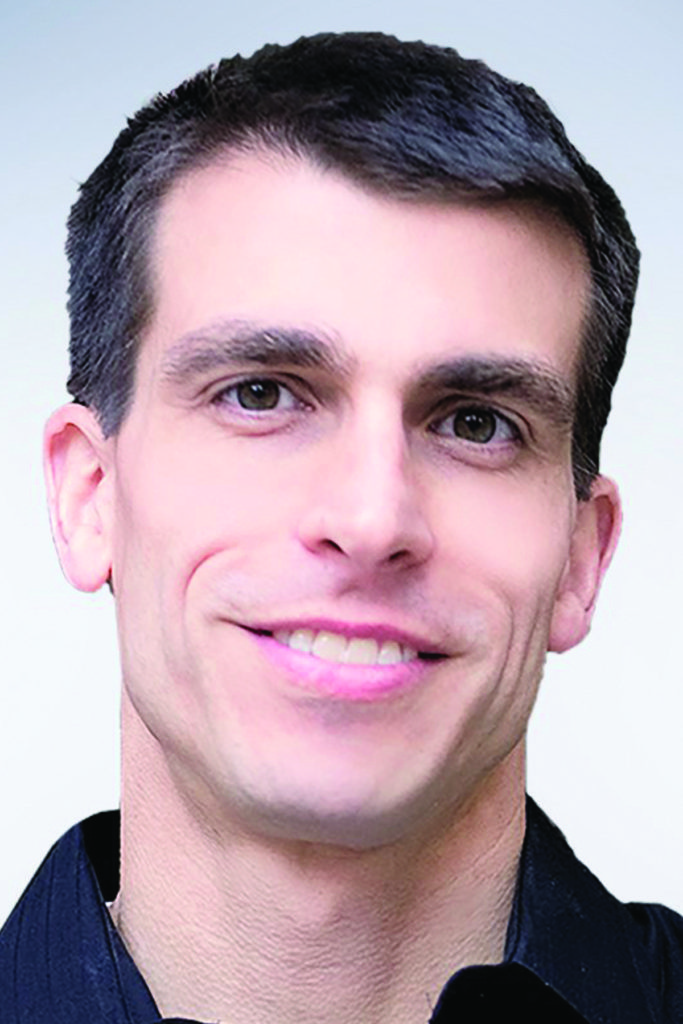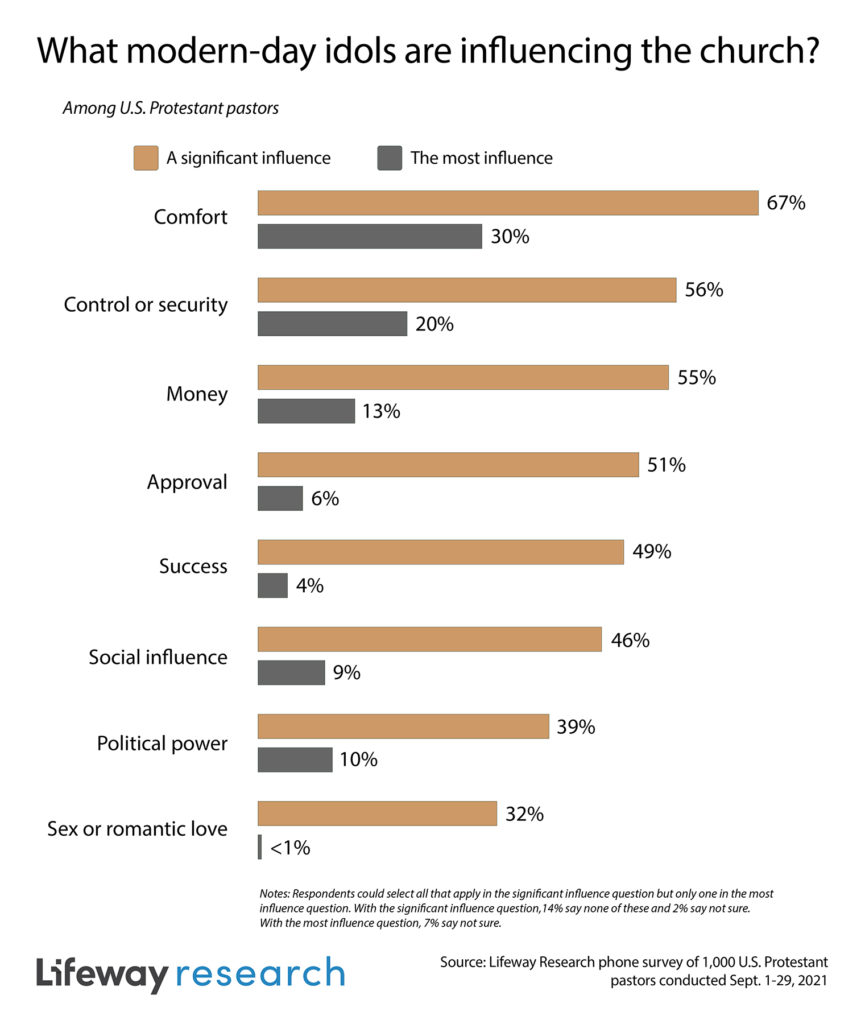NASHVILLE, Tenn. (LifeWay Research and local reports) — Idols don’t always come in the form of pagan rituals and carved statues in ancient places of false religions.
According to new a study from Lifeway Research, U.S. Protestant pastors believe personal comfort (67%), worldly control or personal security (56%), money (55%), and secular approval (51%) are idols that have significant influence on their congregations.
LifeWay Research is the Nashville-based evangelical research arm of Southern Baptist’s LifeWay Christian Resources that specializes in surveys about faith in culture and matters that affect churches.

“It’s easy to think that those in Christian churches have chosen their God and are faithful to Him,” said Scott McConnell, executive director of Lifeway Research. “However, pastors quickly acknowledge how divided their congregations’ allegiances can be. These gods don’t have a physical shrine, but they compete for the hearts of Christians.”
While most pastors point to comfort, security, money, and approval as potential idols, fewer say worldly success (49%) and social influence (46%) are idols in their congregations. Thirty-nine percent say political power is an idol their congregants face, and 32% say sex or romantic love.
Another 14% of pastors say none of these are idols with influence in their churches, and two percent say they’re not sure.
Younger pastors are more likely than older pastors to identify modern-day idols, particularly political power, money, and control or security. Pastors ages 18-44 are the most likely to say political power (55%) and control or security (72%) are idols they see in their congregations.

The younger the pastors who participated in the survey, the more likely they were to see money as a rival object of worship. Pastors ages 18-44 (63%) and 45-54 (58%) are more likely to say money is an idol than pastors 65 and older (46%).
Furthermore, older pastors are less likely to identify any of these potential idols among their congregants. Pastors ages 55-64 (18%) and over 64 (19%) are more likely to perceive none of these as idols than pastors 18-44 (nine percent) or 45-54 (10%).
“The large differences we see between younger and older pastors cannot be definitively explained by this study,” McConnell said. “There are signs that younger pastors are of the mindset that idols are rampant today, whereas older pastors may be slower to classify one of these as having significant influence on their people, or they may define idols more narrowly.”
Some different modern-day idols stand out to pastors of different ethnicities. White pastors are more likely than African American pastors to identify political power (41% vs. 29%) and wordly approval (53% vs. 40%) as idols.
African American pastors are more likely than white pastors to say none of these are idols (25% vs. 13%).
Pastors with higher levels of education are more likely than pastors with less formal education to identify money and control or security as idols. Pastors with master’s degrees (64%) or doctoral degrees (57%) are more likely than those with no college degree (43%) to say money is an idol.
Pastors with master’s degrees (67%) or doctoral degrees (64%) are more likely than those with bachelor’s degrees (47%) or without college degrees (38%) to say control or security. Meanwhile, pastors with no college degree (25%) are the most likely to say none of these are modern-day idols.
Pastors of larger churches are more likely to identify idols of social influence and sex or romantic love as idols among their congregants than pastors of smaller churches. Pastors of churches with more than 250 in attendance (55%) and those with 100-249 (51%) are more likely than those at churches with 50-99 (42%) or less than 50 (39%) to say social influence.
Similarly, pastors at churches with attendance of more than 250 (40%) and 100-249 (39%) are more likely than those at churches with attendance of 50-99 (30%) or fewer than 50 (21%) to identify sex or romantic love as an idol.
“In many ways, the top three idols pastors recognize in their churches are related. Comfort and security draw the hearts of the most congregations, but they are often enabled by the pursuit of more money,” McConnell said.
“Pastors of higher socioeconomic levels are quicker to recognize the influence of security and control while pastors of lower socioeconomic levels more readily see the draw of comforts,” he pointed out.
Denominational differences also play a role in how likely pastors are to say they recognize idolatrous influences in their congregations. Non-denominational (23%) and Pentecostal pastors (20%) are more likely than Methodist (nine percent) or Restorationist movement pastors (six percent) to say they don’t see any of the potential idols influencing people.
Comfort (30%), control or security (20%) and money (13%) also top the list of modern-day idols with the most influence on congregations, but political power (10%) and social influence (nine percent) climbed above approval (six percent) and success (four percent) when pastors were asked to select the one modern-day idol they believe has the most influence.
Less than one percent point to sex or romantic love as the idol with the most influence. Another seven percent say they aren’t sure.
“Americans’ obsession with pursuing more ‘stuff’ is clearly seen within the church as well,” McConnell said. “The largest number of congregations battle the influence of First World comforts, and churches’ second most common modern-day idol is the commitment to keeping secure the comforts they already have.”
The allure of political power is more common in certain congregations. White pastors (12%) are more likely than African American pastors (two percent) to say political power is the modern-day idol with the most influence.
Younger pastors, those 18-44 (14%) and 45-54 (13%), are more likely than pastors over 65 (five percent) to identify political power as the most influential idol. Pastors in the Midwest (14%) and West (14%) are also among the most likely to list political power.
Furthermore, pastors of Baptist (11%), Methodist (11%) and non-denominational (15%) churches are more likely than pastors of Presbyterian/Reformed (four percent) churches to say political power is most noticeable among the idols in their congregations.
Social influence holds more sway in large churches and is more often spotted by older clergy. Pastors at larger churches with more than 250 in attendance (17%) are among the most likely to say social influence is the primary idol.
Those over the age of 65 (13%) are more likely than pastors ages 18-44 (five percent) to say social influence is the most influential idol. Restorationist movement pastors (18%) are more likely than Baptist (eight percent), Methodist (eight percent) and Pentecostal (five percent) pastors to say the same.
Denominationally, some pastors are more likely to see success as an idolatrous temptation for their congregations. Pentecostal pastors (13%) are more likely than Baptist (five percent), Methodist (three percent), Presbyterian/Reformed (three percent) and Restorationist movement (less than one percent) pastors to say success is the most influential idol.
View the complete report and visit LifewayResearch.com.








